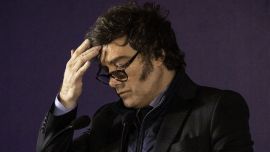Security Minister Patricia Bullrich and Justice Minister Cúneo Libarona have confirmed that Argentina’s government will send a new bill to Congress that will lower the age of criminal responsibility.
Speaking at a press conference, the ministers said that President Javier Milei’s government will submit a new “Criminal Youth Act” that is designed to ensure young law-breakers suffer “consequences” and prevent impunity for crimes committed by minors.
“We’re here to fulfil an obligation to our society. They [the people] do not want impunity. They do not want their children or parents killed, and they do not want there to be no consequences for people who commit crimes," declared Bullrich.
“Starting now, crime – and the worst thing, which is always death – will have consequences and these consequences will be in keeping with the age of the person committing the crimes,” she added.
“The decision by President Javier Milei and the joint teams of these Ministries of Security and Justice is to keep our promise to a society which asks for answers,” said the minister.
“Every day, we decent Argentines experience crimes committed by minors which go unpunished. We can’t allow that. Let’s give judges the structural tools to incarcerate whoever commits a crime,” agreed Cúneo Libarona, a veteran lawyer.
Since taking office last December, Cúneo Libarona has suggested on multiple occasions that the age of criminal responsibility and the penal code should be altered. He previously proposed lowering the age to 14, though the government has now settled on a younger age.
According to a 1983 law which raised the age of criminal responsibility from 14 years old in Argentina, those under the age of 16 are tried under a different penal regime. Only minors convicted of a crime punishable with over two years of jail time are sentenced, and only adults over the age of 18 can go to prison. Minors must be held in a juvenile institution until they are adults.
In other nations in the Americas, such as the United States and Brazil, people under the age of 18 face different criminal proceedings to adults, with different legal consequences. Many nations in Latin America have a lower minimum age than Argentina, such as Chile and Peru (age 14) and Uruguay (age 13).
“At present in Argentina, the criminal liability age is 16, which is why crimes committed by teenagers under that age go unpunished, leading to injustice both for the victims and society in general,” said the government in a statement.
Bullrich argued that the new bill would offer young criminals the opportunity to “have a change of heart and not pursue a career in crime.”
Sentencing guidelines for offences that offer jail terms of three to six years would offer “specific alternatives” to ensure juveniles are not “simply locked up with no way out.”
“This is important because the minor’s environment is what leads them to reoffend. We have to remove them from that situation so they do not pursue a career in crime,” she pointed out.
‘Huge debt’
The government’s new proposal would see teenagers between 13 and 18 who are charged with a crime dealt with under Argentina’s existing criminal code.
In a statement, the Milei administration said the new system would see the courts “afforded the tools to put an end to the doctrine that benefits criminals to the detriment of victims.”
“It’s our duty to update current regulations to finish with the insecurity suffered by decent Argentines,” it added.
"Previous administrations and courts left a huge debt to society. The current law is from the 1980s. Today’s youth does not compare to how they were over four decades ago,” they warned.
“This new law will combat the persistent growth of juvenile delinquency, one of the biggest challenges to the prosperity of our nation. It is common knowledge that organised crime takes advantage of children and teenagers to commit crimes without restrictions, thus evading criminal liability,” continues the statement.
“Criminals will no longer be able to use minors to break the law. Whoever has the audacity to brandish a weapon and take a life must face the law and courts,” it concludes.
According to the government, the reform plan proposed by the government is grounded in four chief aspects: modernisation and adaptation of legislation to current realities; adjusting the regulatory imbalance compared to other countries in the region; the UN Convention on the rights of the child (UNCRC); and the need to expand the State’s tools to reduce the impact of juvenile criminality on society.
“Persistent growth rates of juvenile criminality pose a challenge for public security which requires a comprehensive solution contemplating not only the punitive matter, but also state measures which accompany the minor later, for them to have a future of life in peace and harmony, with social integration and work, understanding and regret of their own behaviour,” said the government in its statement
Ministers Bullrich and Cúneo Libarona were joined at the press conference by Deputy Justice minister Sebastián Amerio, Cabinet Chief of the Security Ministry, Carlos Manfroni, and the National Director of Regulations and Court Liaison, Fernando Soto.
– TIMES/PERFIL/NA


















Comments